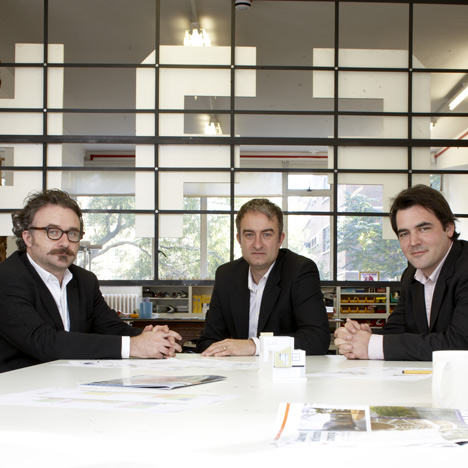News: London architecture office FAT has announced that it will shut down its studio next summer, after "exploring the potential of the projects as much as possible".
FAT directors Sean Griffiths, Charles Holland and Sam Jacob, who became famous for combining Postmodernist architecture with playful iconography, plan to end their 23-year-old practice with the completion of two major projects - the curation of the British Pavilion at the Venice Architecture Biennale 2014 and a house inspired by fairytales that they are working on with artist Grayson Perry for the Living Architecture series of holiday homes.
"We feel like we've explored the potential of the projects as much as possible," Jacob told Dezeen. "We don't want to end up like many architects do, flogging the same dead horse. We think it's best to go out on a high."
"In lots of ways FAT has been more like a band than a traditional architecture office," he added. "We wanted to finish it in a way that's coherent and makes sense."
FAT started in the mid 1990s as a collective of architects, artists and film makers, before going on to complete projects such as the Blue House in London's Hackney, the BBC Drama Production Village in Cardiff and the Community In A Cube (CIAC) in Middlesborough.
"What we're doing is saying there'll be two more projects," said Jacob. "We think this is really the completion of the FAT project which began many years ago, with no intention that we were starting an architecture office and the 'glittering careers' we would have."
After completing the two final projects, the three partners plan to "let the dust settle", but will continue to work within the architecture and design industry. Jacob is currently also a columnist for Dezeen.
Here's the full announcement from FAT:
FAT announces the end of its practice
The highly successful 23 year collaboration will culminate next summer with the completion of A House For Essex, designed for Living Architecture (in collaboration with artist Grayson Perry), and the curation of A Clockwork Jerusalem at the British Pavilion as part of the 2014 Venice Biennale (in collaboration with Crimson Architectural Historians and Owen Hatherley)
Following on from the completion of a number of architecturally significant projects, directors Sean Griffiths, Charles Holland and Sam Jacob believe that, with the conclusion of these final projects, FAT will have achieved all it set out to do when the practice first emerged in the 1990's. FAT was always conceived as a project in itself, a vehicle for critically opening up the culture of architecture rather than purely a conventional architectural practice.
"FAT has provided the three of us with the most extraordinary platform for creative collaboration. We have enjoyed 23 years together and want to end our union on a high with two typically FAT projects – A House For Essex and our curatorial role at the world’s most prestigious architectural event – The Venice Architecture Biennale.”
Evolving out of a 'collective' of architects, artists and film makers, in the mid 1990's, FAT became one of Britain’s most influential architecture practices. Their work pushed the boundaries of architecture by developing innovative forms of cross disciplinary practice and new critical directions in architecture while engaging mainstream clients and delivering a series of highly original buildings in the UK and abroad.
Their work has ranged across installations, interiors, buildings and masterplans that include (amongst others) Kessels Kramers offices in Amsterdam, Kessels Kramers offices in Amsterdam, the BBC Drama Production Village, Cardiff for Igloo, Islington Square for Urban Splash and the Great Places Housing Group, The Villa in Rotterdam and CIAC in Middlesbrough, as well as installations and exhibitions at the Venice Biennale, the V&A, MAK and the Vienna Secession House.
FAT's work has been characterised by a highly conceptual approach, which combined the practical demands of architecture with critical and provocative thinking. Their work demonstrated the creative possibilities for architecture to engage beyond the traditional boundaries of an architecture office and the limits of professional concern.
FAT has also been an influential international presence in architectural education at a diverse range of institutions including the AA, the University of Westminster, the RCA, The Bartlett, the University of the Arts, UIC and Yale.
FAT's final two projects will realise many of the strands that have characterised its work: Pushing the boundaries of architecture, collaboration and working with fine art, a deep interest in the culture of architecture and how architecture relates to wider culture, society and politics.
FAT would like to place on record its thanks to all our collaborators, the students, critics and journalists, who have avidly followed our progress, the outraged BTL commentators who gave us so much entertainment, and above all to the visionary clients who saw the potential for, and who dared to invest in, a unique approach to twenty first century architecture.
FAT's directors will continue to be a presence as individuals in the fields of architecture, design, art, writing and education.
They remain open to offers for a lucrative reunion in 20 years’ time.

